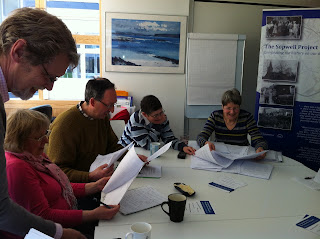On 26th March, Peter and I attended a workshop held at the University of Hertfordshire on the possibility of using the
Historypin website to enhance our project.
Historypin calls itself "A global community collaborating around history" and so could be useful for groups exploring the history and memories of their locality, such as us. You can
watch a 90 second introduction video here.
I found the morning session difficult to follow as it was all general stuff about what Historypin was and its global following, and I couldn't see how it would be relevant to us. Added to this, as I was sitting at the back, I found I couldn't catch everything that was being said. Neither could I see the screen very well.
I know I wasn't the only one who found it all very difficult to take in. There were loads of questions from the other participants, and, as usual, the problem of copyright reared its ugly head. I kept quiet on that although I could have contributed lots. The other delegates seemed to answer each other's questions anyway. I learnt more over lunch and was reassured to hear from the team leaders that there is no obligation for us to use Historypin. It is likely to involve a lot of work in any case.
The afternoon session was more practical - I sat at the front (much better) - and then the pennies started dropping! I began to see how it could be an advantage to become a "Channel" - Historypin speak for someone who joins up and adds images. I think most people understand practical stuff; if it can be seen working in practice, then it is easier to see the relevance, or not. I could see that simply adding a few photos with a link to our website would provide us with another shop window for our site, another way for people to find our site!
We were then told that we can link images into a "Tour", maybe a walking tour, and another penny dropped. Yes, we could put our five planned walks around Sopwell up on Historypin! As we are restricted on text, we cannot add all the history detail but we could direct visitors to our website to find out more, and try to persuade them to
read our book! Alternatively, we can link to audio recordings on YouTube, so we could add a spoken commentary. Historypin also provide a
free Smartphone app, so users could access the information while they were walking, using their mobile phone as a virtual tour guide!
Since then, we have opened a
"More Memories of Sopwell" channel on Historypin and have started uploading a few photos and pinning them onto Google Maps. It's early days still but it has been very straightforward so far except that if an image is not on a street, such as the ruins of Sir Richard Lee's Tudor house in the Nunnery Open Space, it is automatically allocated the nearest street and house number. Often, this information is not helpful to a potential visitor. At the moment, we are not sure how to get round that problem.
We are now advertising for help with the project, some voluntary and some paid. Specifically, we need oral history interviewers, transcribers, help with publicity, website entry and most important - a website developer.
If anyone is interested, please send your details to
info@sopwell.org.uk.
--
Sandy Norman



